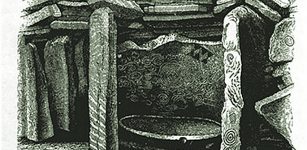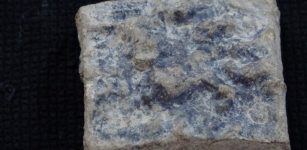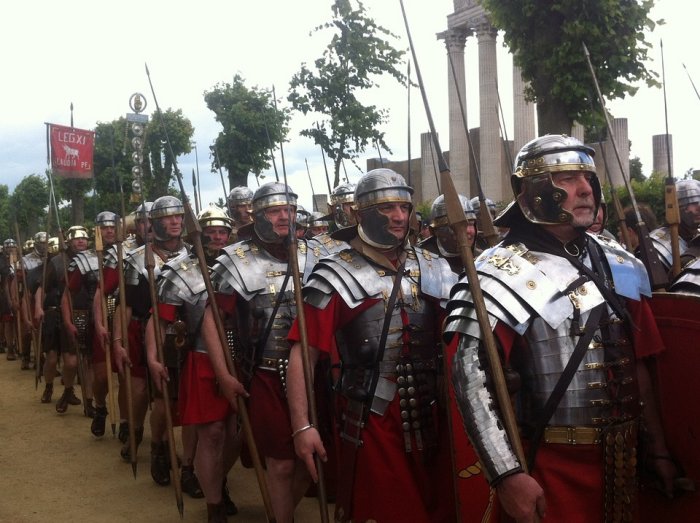The Word Salary Has Roots In Ancient Rome And History Of Salt
Ellen Lloyd - AncientPages.com - Have you ever wondered where the word salary comes from?
The word salary can be traced to ancient Rome and the history of salt. Salt was used as a trading medium just as money is used today. Ancient Roman warriors who served the empire received payment with a handful of salt each day. Roman historian Pliny the Elder, stated as an aside in his Natural History's discussion of seawater, that "In Rome. . .the soldier's pay was originally salt and the word salary derives from it.”
However, according to more modern sources, it is stated that although Roman soldiers were typically paid in coin, the word salarium is derived from the word sal (salt) because at some point a soldier's salary may have been an allowance for the purchase of salt the price of having soldiers conquer salt supplies and guard the Salt Roads (Via Salaria) that led to Rome.
See also:
Ancient Round Coins Were Invented To Prevent Fraud
Beer Was Used As Medicine And Payment In Ancient Egypt
What Was Legio Martia And Why Were The Roman Soldiers Called The Martians?
There are also some people who claim that the word soldier itself comes from the Latin sal dare (to give salt), but most historians disagree, noting that the word soldier more likely derives from the gold solidus, with which soldiers were known to have been paid.
When the term salarium entered into English it was modified to modern-day salary!
Written by - Ellen Lloyd - AncientPages.com
Copyright © AncientPages.com All rights reserved. This material may not be published, broadcast, rewritten or redistributed in whole or part without the express written permission of AncientPages.com
Expand for referencesMore From Ancient Pages
-
 Nakano Takeko – Courageous Female Samurai Who Died Tragically While Defending The Aizu-Wakamatsu Castle
Featured Stories | Apr 24, 2021
Nakano Takeko – Courageous Female Samurai Who Died Tragically While Defending The Aizu-Wakamatsu Castle
Featured Stories | Apr 24, 2021 -
 Unique Tomb Of Roman Noblewoman Caecilia Metella Reveals Secrets Of Ancient Concrete Resilience
Archaeology | Oct 14, 2021
Unique Tomb Of Roman Noblewoman Caecilia Metella Reveals Secrets Of Ancient Concrete Resilience
Archaeology | Oct 14, 2021 -
 Opium Residue Discovered In 3,500-Year-Old Pottery Offers Evidence The Drug Was Used In Ancient Burial Rituals
Archaeology | Sep 20, 2022
Opium Residue Discovered In 3,500-Year-Old Pottery Offers Evidence The Drug Was Used In Ancient Burial Rituals
Archaeology | Sep 20, 2022 -
 Birch Bark Tar Production Techniques Offer Evidence Neanderthals Had Cognitive Skills Similar To Modern Thinking
Archaeology | Sep 26, 2023
Birch Bark Tar Production Techniques Offer Evidence Neanderthals Had Cognitive Skills Similar To Modern Thinking
Archaeology | Sep 26, 2023 -
 Unexpected Discovery Of Two Viking Swords In Upright Position In Sweden
Archaeology | Oct 27, 2022
Unexpected Discovery Of Two Viking Swords In Upright Position In Sweden
Archaeology | Oct 27, 2022 -
 Race To Save Magnificent Underwater Stone Age Paintings Hidden In The Cosquer Cave
Archaeology | Jun 6, 2022
Race To Save Magnificent Underwater Stone Age Paintings Hidden In The Cosquer Cave
Archaeology | Jun 6, 2022 -
 Legend Of Evil Spearfinger And The Cherokee Who Were Guided By Celestial Beings
Featured Stories | Feb 17, 2020
Legend Of Evil Spearfinger And The Cherokee Who Were Guided By Celestial Beings
Featured Stories | Feb 17, 2020 -
 Graveyards Of Ancient British And French Giants Revealed In Old Documents And Journals
Featured Stories | Jul 4, 2020
Graveyards Of Ancient British And French Giants Revealed In Old Documents And Journals
Featured Stories | Jul 4, 2020 -
 On This Day In History: HMS Challenger Begins Scientific Exploration Of Oceans – On Dec 21, 1872
News | Dec 21, 2016
On This Day In History: HMS Challenger Begins Scientific Exploration Of Oceans – On Dec 21, 1872
News | Dec 21, 2016 -
 Unsolved Mystery Of The Aleppo Codex And Its Missing Pages: One Of The World’s Most Precious Ancient Books
Artifacts | Feb 27, 2017
Unsolved Mystery Of The Aleppo Codex And Its Missing Pages: One Of The World’s Most Precious Ancient Books
Artifacts | Feb 27, 2017 -
 Secret Writing On Mummy Papyrus Revealed – Scan Technique Will Shed Light On Daily Life In Ancient Egypt
Archaeology | Jan 1, 2018
Secret Writing On Mummy Papyrus Revealed – Scan Technique Will Shed Light On Daily Life In Ancient Egypt
Archaeology | Jan 1, 2018 -
 DNA Of 10,000-Year-Old Skeletal Remains And Kinship Of Earliest World Settlers
Archaeology | Apr 21, 2021
DNA Of 10,000-Year-Old Skeletal Remains And Kinship Of Earliest World Settlers
Archaeology | Apr 21, 2021 -
 3D Scans Reveal Secrets Of Rare Ancient Canoe From Lake Mendota In Wisconsin
Archaeology | Jun 3, 2022
3D Scans Reveal Secrets Of Rare Ancient Canoe From Lake Mendota In Wisconsin
Archaeology | Jun 3, 2022 -
 Ancient Irish Were First To Record An Eclipse – 5,355 Years Ago
Civilizations | Jul 31, 2015
Ancient Irish Were First To Record An Eclipse – 5,355 Years Ago
Civilizations | Jul 31, 2015 -
 Shin-Au-Av – Secret Ancient Underground City Hidden Beneath Death Valley
Featured Stories | Jun 7, 2014
Shin-Au-Av – Secret Ancient Underground City Hidden Beneath Death Valley
Featured Stories | Jun 7, 2014 -
 Mystery Of Gigantic Lion Sculptures Dated To The Hittite Era
Archaeology | Apr 14, 2016
Mystery Of Gigantic Lion Sculptures Dated To The Hittite Era
Archaeology | Apr 14, 2016 -
 ‘Holystone’ – Stone Chest With Jesus Christ’s Cross Found At Balatlar Church In Turkey’s Sinop
Archaeology | Mar 4, 2020
‘Holystone’ – Stone Chest With Jesus Christ’s Cross Found At Balatlar Church In Turkey’s Sinop
Archaeology | Mar 4, 2020 -
 Mystery Of The Lost Arctic Civilization- Two Ancient Mummies Found At The Zeleny Yar Necropolis
Archaeology | Jul 20, 2017
Mystery Of The Lost Arctic Civilization- Two Ancient Mummies Found At The Zeleny Yar Necropolis
Archaeology | Jul 20, 2017 -
 Abu Erteila’s Lost Temple And The Meroitic Empire: New Discoveries Shed Light On Nubian Civilization
Archaeology | Jan 14, 2016
Abu Erteila’s Lost Temple And The Meroitic Empire: New Discoveries Shed Light On Nubian Civilization
Archaeology | Jan 14, 2016 -
 2,300-Year-Old Roman Lead Weight In Assos Is The Largest Ever Discovered
Archaeology | Aug 15, 2023
2,300-Year-Old Roman Lead Weight In Assos Is The Largest Ever Discovered
Archaeology | Aug 15, 2023

